
Reform of the United Nations Security Council (UNSC) encompasses five key issues: categories of membership, the question of the veto held by the five permanent members, regional representation, the size of an enlarged Council and its working methods, and the Security Council-General Assembly relationship. The Member States, regional groups and other Member State interest groupings developed different positions and proposals on how to move forward on this contested issue.

The 2006 United Nations Security Council election began on 16 October 2006 during the 61st session of the United Nations General Assembly, held at United Nations Headquarters in New York City. The elections were for five non-permanent seats on the Security Council for two-year mandates commencing on 1 January 2007.

The 2009 United Nations Security Council election was held on 15 October 2009 during the 64th session of the United Nations General Assembly, held at United Nations Headquarters in New York City. The election was for five non-permanent seats on the UN Security Council to serve two-year mandates commencing on 1 January 2010.
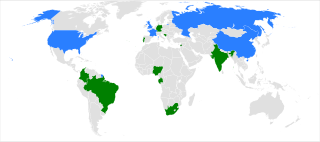
The 2010 United Nations Security Council election was held on 12 October 2010 during the 65th session of the United Nations General Assembly, held at United Nations Headquarters in New York City. The elections were for five non-permanent seats on the UN Security Council for two-year mandates commencing on 1 January 2011. The General Assembly elected Colombia, Germany, India, Portugal, and South Africa.

The 2014 United Nations Security Council election was held on 16 October 2014 during the 69th session of the United Nations General Assembly, held at United Nations Headquarters in New York City. The elections were for five non-permanent seats on the UN Security Council for two-year mandates commencing on 1 January 2015. In accordance with the Security Council's rotation rules, whereby the ten non-permanent UNSC seats rotate among the various regional blocs into which UN member states traditionally divide themselves for voting and representation purposes, the five available seats were allocated as follows:

The 2011 United Nations Security Council election was held on 21 and 24 October 2011 during the Sixty-sixth session of the United Nations General Assembly, held at United Nations Headquarters in New York City. The General Assembly elected Azerbaijan, Guatemala, Morocco, Pakistan, and Togo, as the five new non-permanent members of the UN Security Council for two-year mandates commencing on 1 January 2012. Azerbaijan was elected after 17 rounds on 24 October, while the other four new members were chosen on 21 October.

The 2013 United Nations Security Council election was held on 17 October 2013 during the 68th session of the United Nations General Assembly, held at United Nations Headquarters in New York City. The Assembly elected Chad, Chile, Lithuania, Nigeria, and Saudi Arabia for five non-permanent seats on the UN Security Council for two-year mandates commencing on 1 January 2014. The following day, Saudi Arabia announced that it was declining the seat, accusing UNSC of using "double standards" and being unable to resolve important issues in the Middle East. A second round of voting therefore took place on 6 December, in which Jordan was elected to the council in lieu of Saudi Arabia.

The first ever United Nations Security Council elections were held on 12 January 1946 during the 1st session of the United Nations General Assembly, held at Westminster Central Hall in the City of Westminster, London, England, United Kingdom. The elections were for six non-permanent seats on the UN Security Council for two- and one-year mandates commencing immediately upon election, and to expire upon the date of the next elections, in November 1946 and September 1947, respectively.
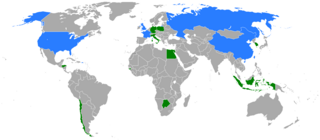
The 1995 United Nations Security Council election was held on 8 November 1995 at United Nations Headquarters in New York City during the 50th session of the United Nations General Assembly. The General Assembly elected five non-permanent members of the UN Security Council for two-year terms commencing on 1 January 1996.

The 1993 United Nations Security Council election was held on 29 October 1993 during the Forty-eighth session of the United Nations General Assembly, held at United Nations Headquarters in New York City. The General Assembly elected Argentina, the Czech Republic, Nigeria, Oman, and Rwanda, as the five new non-permanent members of the UN Security Council for two-year mandates commencing on 1 January 1994. Oman and Rwanda were elected for the first time ever, while the Czech Republic was elected for the first time as a separate country after the dissolution of Czechoslovakia.

The Sixty-seventh session of the United Nations General Assembly opened on 18 September 2012 and having its last scheduled meeting on 11 September 2013. The President of the United Nations General Assembly was chosen from the EEG with Serbia's then foreign minister Vuk Jeremić beating out Lithuania's Dalius Čekuolis in an election. Notably, the session led to United Nations General Assembly resolution 67/19 which granted Palestine non-member observer state status.

The 1977 United Nations Security Council election was held on 24 October 1977 during the Thirty-second session of the United Nations General Assembly, held at United Nations Headquarters in New York City. The General Assembly elected Bolivia, Czechoslovakia, Gabon, Kuwait, and Nigeria, as the five new non-permanent members of the UN Security Council for two-year mandates commencing on 1 January 1978. Gabon and Kuwait were elected to the Council for the first time.
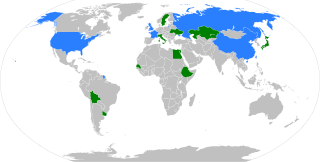
The 2016 United Nations Security Council election was held on 28 June during the 70th session of the United Nations General Assembly, held at United Nations Headquarters in New York City. The elections were for five non-permanent seats on the UN Security Council for two-year mandates commencing on 1 January 2017. In accordance with the Security Council's rotation rules, whereby the ten non-permanent UNSC seats rotate among the various regional blocs into which UN member states traditionally divide themselves for voting and representation purposes, the five available seats were allocated as follows:
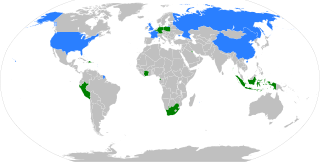
The 2018 United Nations Security Council election was held on 8 June during the 72nd session of the United Nations General Assembly, held at United Nations Headquarters in New York City. The elections were for five non-permanent seats on the UN Security Council for two-year mandates commencing on 1 January 2019.

The 2020 United Nations Security Council election was held on 17 and 18 June 2020 during the 74th session of the United Nations General Assembly, held at United Nations Headquarters in New York City. The elections were for five non-permanent seats on the UN Security Council for two-year mandates commencing on 1 January 2021.

The 1975 United Nations Security Council election was held on between 20 October and 23 October 1975 during the Thirtieth session of the United Nations General Assembly, held at United Nations Headquarters in New York City. The General Assembly elected Dahomey, Libya, Pakistan, Panama, and Romania, as the five new non-permanent members of the UN Security Council for two-year mandates commencing on 1 January 1976. Benin and Libya were elected for the first time.
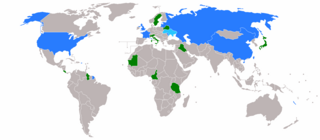
The 1974 United Nations Security Council election was held on 11 October 1974 during the Twenty-ninth session of the United Nations General Assembly, held at United Nations Headquarters in New York City. The General Assembly elected Guyana, Italy, Japan, Sweden, and Tanzania, as the five new non-permanent members of the UN Security Council for two-year mandates commencing on 1 January 1975. Both Guyana and Tanzania were elected to the council for the first time.

The 1971 United Nations Security Council election was held on 23 November 1971 during the Twenty-sixth session of the United Nations General Assembly, held at United Nations Headquarters in New York City. The General Assembly elected Guinea, India, Panama, Sudan, and Yugoslavia, as the five new non-permanent members of the UN Security Council for two-year mandates commencing on 1 January 1972. It was the first election of Guinea and Sudan into the council.
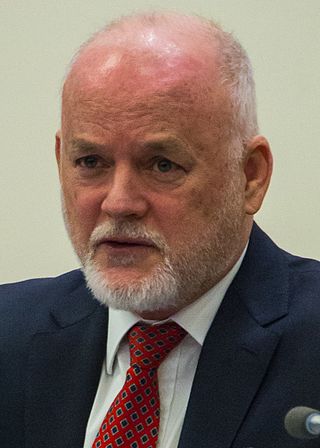
The Seventy-first Session of the United Nations General Assembly opened on 13 September 2016. The President of the United Nations General Assembly is from the Asia-Pacific Group.



















